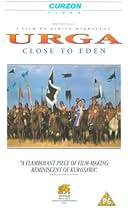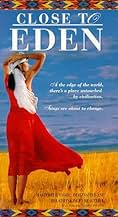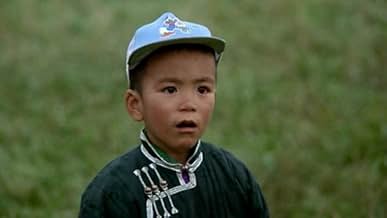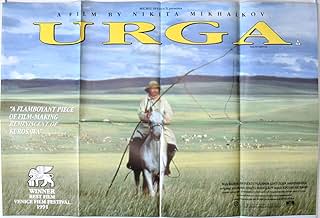IMDb-BEWERTUNG
7,5/10
3986
IHRE BEWERTUNG
Füge eine Handlung in deiner Sprache hinzuA curious friendship develops between Gombo, a young Mongolian shepherd living with his wife and family in a hut, deep in the wilderness of the steppes, and Sergei, a Russian worker whose tr... Alles lesenA curious friendship develops between Gombo, a young Mongolian shepherd living with his wife and family in a hut, deep in the wilderness of the steppes, and Sergei, a Russian worker whose truck breaks down not far from Gombo's hut.A curious friendship develops between Gombo, a young Mongolian shepherd living with his wife and family in a hut, deep in the wilderness of the steppes, and Sergei, a Russian worker whose truck breaks down not far from Gombo's hut.
- Für 1 Oscar nominiert
- 5 Gewinne & 12 Nominierungen insgesamt
Nikolay Vashchilin
- Nikolai
- (as Nikolai Vachtchiline)
Larisa Kuznetsova
- Marina
- (as Larisa Kuwnetsova)
Nikita Mikhalkov
- Bicycle rider
- (Nicht genannt)
Empfohlene Bewertungen
The best definition I can give to movies I greatly admire is that they take me someplace I don't expect to go.
It can be a special location. It can be a special moment. It can be a special revelation.
Close to Eden, as this movie has been titled in the United States, offers the entire combination. A 1992 Russian nominee for the Oscar for Best Foreign Language Film, the movie opens on the vast grassy expanses of the steppes of Mongolia, where the setting initially is evocative of a certain timelessness. The historical instant cannot be ascertained confidently, even within an error margin of a few centuries. Nor do we know what the movie designs ultimately to tell us.
Such uncertainty begins to give way as a vehicle and visitor enter the scene and are involved in a mishap that results from first sleepiness and then fright. The nature of the vehicle and visitor narrow the reference era to an accuracy level of mere decades. From there, the plot leads to a likable nuclear family of herders, to which a grandmother is attached. We follow their story and soon learn when, among the vast expanses of time, it occurs.
The theme here is subtly...ecological...in three parts. The first part concerns the lifestyle of the family, and its self-sufficiency. The second part concerns the travel the father undertakes, and the reason for the travel, an assigned errand he seeks to accomplish in the course of that journey. The third part concerns the conclusion, where the issue of time again intervenes. There is in fact no timelessness, but rather its passage. The narrator in A River Runs Through It is "haunted by waters." Similarly, the ending of Close to Eden is haunted by grasses. Its status as one of the great foreign films arrives in the last few knockout minutes.
It can be a special location. It can be a special moment. It can be a special revelation.
Close to Eden, as this movie has been titled in the United States, offers the entire combination. A 1992 Russian nominee for the Oscar for Best Foreign Language Film, the movie opens on the vast grassy expanses of the steppes of Mongolia, where the setting initially is evocative of a certain timelessness. The historical instant cannot be ascertained confidently, even within an error margin of a few centuries. Nor do we know what the movie designs ultimately to tell us.
Such uncertainty begins to give way as a vehicle and visitor enter the scene and are involved in a mishap that results from first sleepiness and then fright. The nature of the vehicle and visitor narrow the reference era to an accuracy level of mere decades. From there, the plot leads to a likable nuclear family of herders, to which a grandmother is attached. We follow their story and soon learn when, among the vast expanses of time, it occurs.
The theme here is subtly...ecological...in three parts. The first part concerns the lifestyle of the family, and its self-sufficiency. The second part concerns the travel the father undertakes, and the reason for the travel, an assigned errand he seeks to accomplish in the course of that journey. The third part concerns the conclusion, where the issue of time again intervenes. There is in fact no timelessness, but rather its passage. The narrator in A River Runs Through It is "haunted by waters." Similarly, the ending of Close to Eden is haunted by grasses. Its status as one of the great foreign films arrives in the last few knockout minutes.
Nikita Mihalkov is a god when it comes to film. The guy below me is probably a not very smart, Hollywood films are 20% good and the rest is garbage just like your comment. I have seen but a few good American films the rest is the same old crap. I would like to say that American films have no life its always the same. This film has an amazing plot with its twist and turns make it a master piece. I am just trying to get my point across but the policy won't let me have anything smalled than 10 lines. I would love to me Nikita Mihalkov and just let him know that he is such a great director. So please when you see this really try to learn to speak and understand the Russian language so you can actually grasp what the movies is all about and really suck in the meaning of it.
If you ever wondered how an ordinary life could have been like without constant bombardment of television, ads and all the trappings of a hierarchical society, this movie beautifully depicts the life such a family, in the process of being unconsciously absorbed by the modernity the rest of us are so familiar with. The lead guy's performance as he tries to bemusedly make sense of the city and its services and warez is very touching. Its sad to see a strong, capable, independent soul finely tuned to the nature he is part of being slowly displaced by the "greater" civilisation, but its also an uplifting narrative of escapisim to a place where the contradictions and pretensions of the organised society does not exist.
10johan-16
This movie shows us a world without any borders, laws. Just a bunch of people who live in a superb nature, which fills the wide moviescreen in its endless beauty. It reminds us, how far we are away from nature, from our roots of our ancesters. That's why I think this movie appeals the people from all over the world. And especially those who like the widescreen movies from John Huston to Visconti. Only for the superb shots you can see it over and over again. It's, without any doubt a timeless beaty
Urga is an excellent example of the magic of film in allowing people of very different cultures to communicate their various realities and common humanity. To someone like myself coming from a "modern developed culture", I found this tale of a culture that has only recently experienced the impact of "western" society, an entrancing and wonderful experience. It is visually beautiful, frequently wildly funny and life-affirming. For an unusual and extremely accessible film experience - or as a primer for the intending visitor - Urga can be heartily recommended.
Wusstest du schon
- WissenswertesThis was the first film nominated for an Academy Award for Best Foreign Language Film from Russia. Previous nominees from that country had been submitted from The Soviet Union. It lost to France's Indochine (1992).
Top-Auswahl
Melde dich zum Bewerten an und greife auf die Watchlist für personalisierte Empfehlungen zu.
- How long is Close to Eden?Powered by Alexa
Details
Box Office
- Bruttoertrag in den USA und Kanada
- 377.832 $
- Weltweiter Bruttoertrag
- 377.832 $
- Laufzeit1 Stunde 59 Minuten
- Farbe
- Seitenverhältnis
- 1.85 : 1
Zu dieser Seite beitragen
Bearbeitung vorschlagen oder fehlenden Inhalt hinzufügen


























